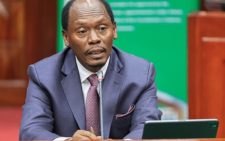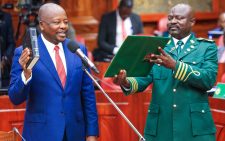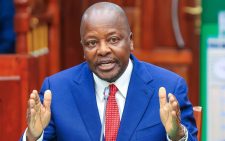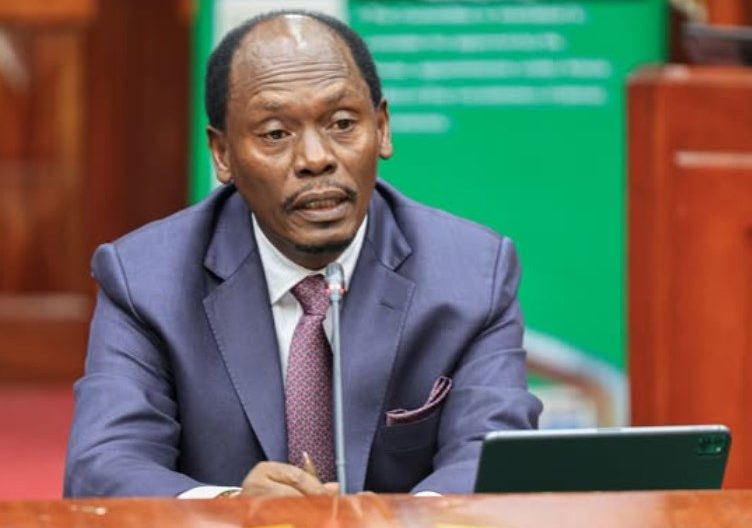Kenyan police force for Haiti mission to deploy next week
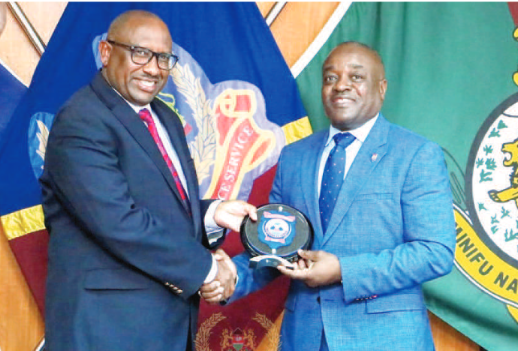
Kenyan police officers scheduled to lead a complicated and potentially risky multi-national security support mission in Haiti are expected to finally leave the country next Sunday.
The deployment, which is behind schedule, has faced several protracted hurdles and had at one point been declared illegal by the High Court.
The officers, who are expected in the Caribbean nation on Tuesday next week, have undergone months of training, with government officials saying they are well prepared to neutralise gangs that are equally armed with superior and sophisticated weapons and have previously overpowered the local police in that country.
This is an opportunity to put Kenya in the global arena as a nation that does noble things, said government spokesperson Isaac Mwaura, who confirmed the planned deployment.
“We are committed to honouring our international obligations as a government and a nation,” Mwaura said The deployment will coincide with Pres-identWilliam Ruto’s three-day state visit to the United States to discuss several issues, including trade, investment, regional security, and the Haiti mission.
Living quarters
The President is expected in Washing-ton, DC, on Thursday, May 23. US civilian contractors have built the living quarters from which Kenyan forces will operate, according to the US military’s Southern Command.
Haiti is not at war, but killings, lawlessness, gang violence, drug dealing, kidnapping, looting, extortion, and rape have been on the increase, rendering the local understaffed and under-resourced police ineffective.
The Kenya-led force is expected to help Haiti’s police officers, who number only about 10,000 for the nation’s more than 11 million people. Ten other nations – including Jamaica, the Bahamas and Antigua and Barbuda – have also expressed their readiness to support.
According to UN resolutions, the force is expected to build the capacity of local police planning, conduct joint security support operations and secure critical infrastructure sites and transit locations such as the airport in Port-au-Prince, key intersections in the capital, and ports.
Robust force
The officers come from specialised units in the General Service Unit (GSU) and the Administration Police, including the Special Operations Group, the Rapid Deployment Unit, the Special Recce Team, and the Special Weapons and Tactics (SWAT) team.
The force will not operate under a UN flag, but it is sponsored by the United States. According to Chapter VII of the UN Charter, the use of force is authorised after all other measures to maintain international peace and security are exhausted. On October 3 last year, the 15 members of the United Nations (UN) Security Council voted to deploy the Kenya-led forces.
The membership includes five nations that are permanent with veto powers, including China, France, the Russian Federation, the United Kingdom and the US. The 10 non-permanent members are Albania, Brazil, Ecuador, Gabon, Ghana, Japan, Malta, Mozambique, Switzerland, and the United Arab Emirates.
In a previous briefing, UN Secretary General General Antoniontonio Guterres confirmed that the Kenyan team will, if need be, be expected to use robust force to disarm and neutralise the gangs in order to restore order. In an earlier interview, Inspector General of Police Japhet Koome also expressed optimism for the mission.
“We will lead this mission. We have never failed. We will succeed there too,” he said. The mission has suffered major setbacks since it was approved in October last year. The High Court, in blocking the deployment, raised several issues, but Interior Cabinet Secretary Kithure Kindiki said they had all been addressed. Laws and enforcement measures, such as detention and arrests, had been finalised, he said.
Opposition to deployment
The US Congress, Kenya National Civil Society Centre and Amnesty International Kenya also opposed the deployment, saying Kenyan officers had a well-documented record of violating human rights.
“With the absence of clear objectives for this MSS mission, we strongly believe that funding this security operation in tandem with continued support for the de facto Haitian authorities is a misguided strategy that may have catastrophic repercussions for the Haitian people,” the Congress warned. Insecurity in Haiti escalated after the July 2021 assassination of President Tovenel Moise.
Former Prime Minister Ariel Henry took over after Moise’s death but was later forced to resign. In 2022, Henry urged nations to step forward and intervene, including to address the then-gang-led blockade of fuel terminals and humanitarian aid. Other countries and Guterres accepted the request. In July last year, during a visit to Port-au-Prince, Guterres noted the seriousness of the situation, saying it demanded their urgent and sustained attention.
“We must put the victims and the civilian population at the centre of our concerns and priorities. If we do not act now, instability and violence will have a lasting impact on generations of Haitians,” he said. In early March this year, Henry travelled to Kenya but the gangs took control of the streets of Port-au-Prince, calling for his resignation while he was away, leaving him stranded in the US territory of Puerto Rico. An alliance of gangs is led by Jimmy “Bar-becue” Cherizier, a former police officer.
On March 11, Henry, while stranded in Puerto Rico, finally succumbed to the gangs’ pressure and resigned to make way for a transitional authority.
US support
The resignation came just hours after regional leaders met in Jamaica in a meeting attended by US Secretary of State Antony Blinken.
The forces being deployed will help the Haiti National Police (HNP), which was created in 1995 to bring public security under civilian control. It had been part of the Haitian army since 1912. The HNP is, however, plagued by militarism, factionalism, and corruption, and is mainly viewed by citizens as repressive.
It officially has a force of 15,498 police officers, of whom only 1,711 are women, though the number of effective officers is estimated to be much lower. The US has pledged $100 million (Sh14.5 billion) for the mission, with Blinken saying the Joe Biden administration was keen to ensure that the mission succeeds.
The support will include logistics, intelligence, communication, and medical assistance. Biden pledged on September 23 to cover logistics, intelligence, communication, and medical support for the Kenyan force.




